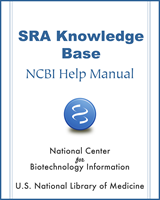NCBI Bookshelf. A service of the National Library of Medicine, National Institutes of Health.
SRA Knowledge Base [Internet]. Bethesda (MD): National Center for Biotechnology Information (US); 2011-.
This publication is provided for historical reference only and the information may be out of date.
What is the purpose of the SRA toolkit?
The SRA Toolkit, and the source-code SRA System Development Kit (SDK), will allow you to programmatically access data housed within SRA and convert it from the SRA format to the following formats:
You can also use the toolkit to convert from the formats listed below into the SRA format (not required for submission, but will allow you to use the SRA Toolkit to archive or analyze your data):
The SRA toolkit is available in versions compatible with Linux, Windows and Mac operating systems.
How do I download and install the SRA Toolkit?
The SRA Toolkit can be obtained from SRA Software page. Please note that as of version 2.3.2, only 64-bit versions of the Toolkit are being produced. The reasons for this decision are manifold, but are primarily due to the limited memory and processing capacities of 32-bit operating systems, which are insufficient for handling large SRA data files. Legacy versions of the Toolkit, including previous 32-bit versions, are available here, but please note that we are serving these files “as is” – we are happy to assist with usage (email vog.hin.mln.ibcn@ars), but bugs (known and unknown) will not be addressed. It is strongly recommended that you configure the Toolkit prior to using it to extract data.
How do I use the SRA Toolkit to convert data into a particular format?
The SRA Toolkit contains a series of independent data-“dump” utilities that will allow you to convert SRA data into different file formats. As of version 2.3.2, the list of “dumpers” that are included with the toolkit include:
Each of the above links will open the current documentation / help page for the respective utility, which include frequently used options and their definitions, usage examples, and common errors messages / solutions. Please send all Toolkit questions to: vog.hin.mln.ibcn@ars
I’m having problems using the toolkit, and the documentation doesn’t cover the problem I’m having. Who do I contact for help?
Send any toolkit questions you have to: vog.hin.mln.ibcn@ars
Be sure to provide as much detail as possible so that we may more quickly diagnose your problem: Your operating system, Toolkit version, the command that you are attempting to execute, error messages and/or the “ncbi_error_report.xml” (if one was generated).
- Using the SRA Toolkit to convert .sra files into other formats - SRA Knowledge B...Using the SRA Toolkit to convert .sra files into other formats - SRA Knowledge Base
- Homologene neighbors for GEO Profiles (Select 132033020) (0)GEO Profiles
- Profile neighbors for GEO Profiles (Select 114369520) (79)GEO Profiles
- Chromosome neighbors for GEO Profiles (Select 126833420) (20)GEO Profiles
- Chromosome neighbors for GEO Profiles (Select 41400279) (20)GEO Profiles
Your browsing activity is empty.
Activity recording is turned off.
See more...
